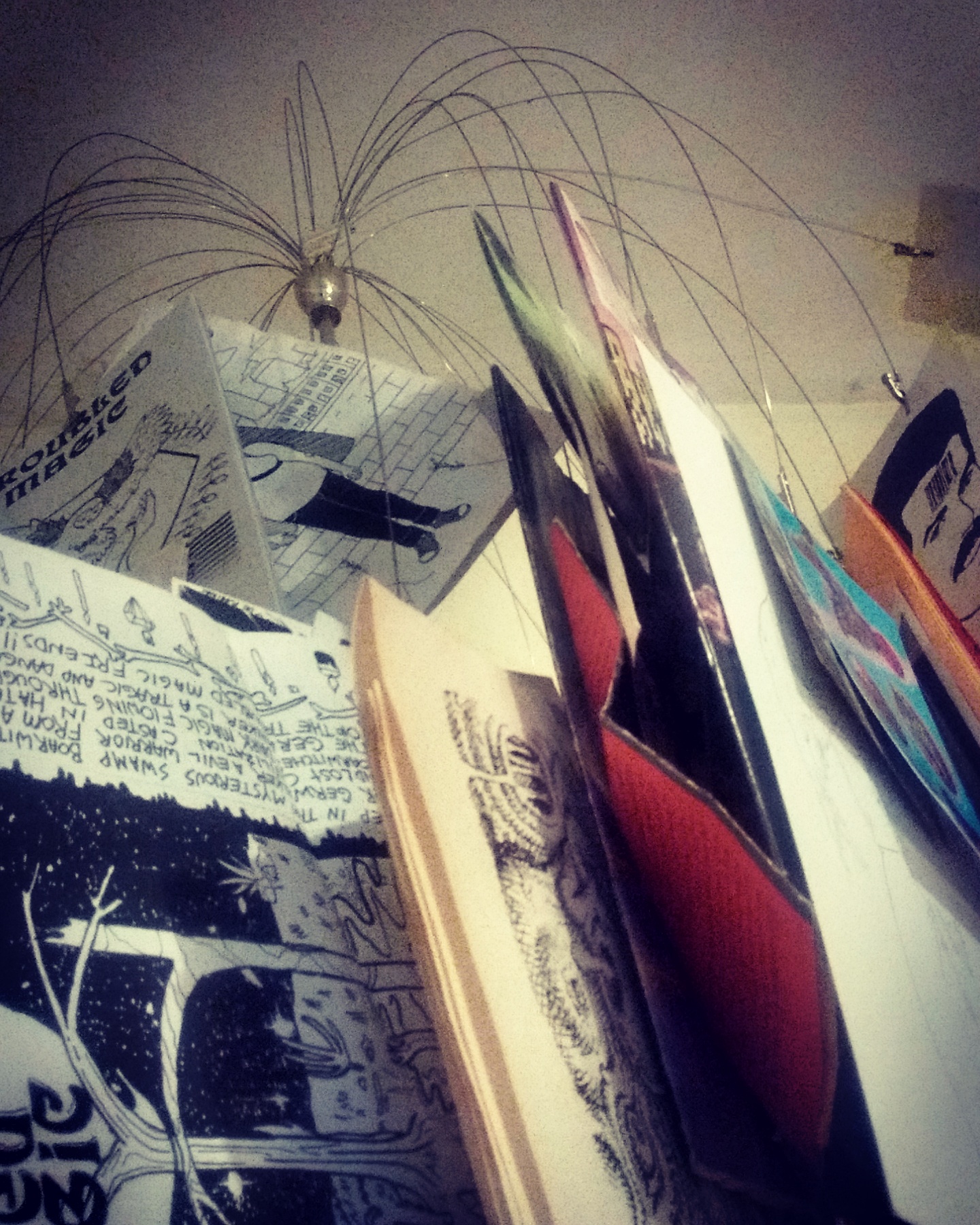 |
Welcome to my 'zine tree! Here in my studio, I've got this wire-y thing hanging above my computer desk chock-full of paper goods that have kept me curious. Instead of filing one thing away when I wish to add something, I've decided to do these features about some of the creators' works on the tree. There's a little bit of everything up there - some photography, some stickers, some floppy comics, but most of it is cartoon and comics art and all of it is independently produced. |
|---|
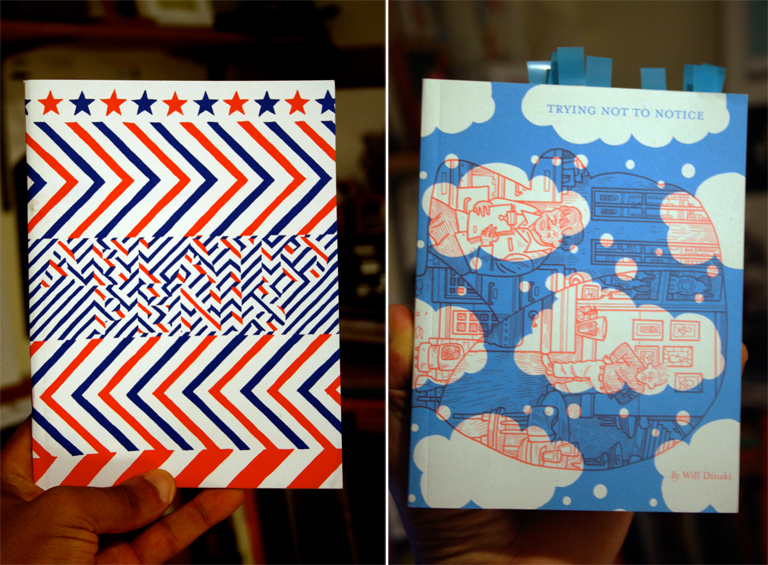 BIO: Will Dinski has worked in design and print production for over ten years, and has been illustrating and drawing comics for much longer. His books have been published by Top Shelf Productions and 2D Cloud. --------- AG: ABLATIO PENIS focuses on the inner workings of a conservative candidate, Andre St. Louis, who is running for governor. What I really liked here was the character development. Let me stop and first say that I have conservative friends, but I’ve never seen the interactions of those friends with people who share their values, their politics. And while I did not grow up in a red state, the divide (in Delaware) was serene, not jagged. In our current media environment, we are usually exposed to the conservative mindset through its politicians and its extremists. These characters were quite complex, and the women in this story are all very distinctive. Is this a book about sexism? WD: Ha! My wife is also from Delaware, and her folks are split politically. One's Conservative and one's Democrat. We don’t talk politics much. Before I started writing Ablatio Penis, I thought that it would be interesting to write a story about how what we hide can reveal itself through our public persona. So, I tried to think of the most interesting secret, and the most public of personas. A politician without a penis sounded like a crazy story to write. I wasn’t overtly saying anything about sexism, although I did want more experience writing women characters. It also amused me to think that I was writing a comic with “Penis” right in the title and there wouldn’t be a single dick in the whole story. Raighne [Hogan, Dinski's publisher at 2D Cloud] and I used to make a lot of dick jokes after that book came out, just to crack each other up while standing behind some card table at one of many random comics shows. My favorite was when he told me that it just seemed appropriate that we printed the book at Johnson Litho. |
|---|
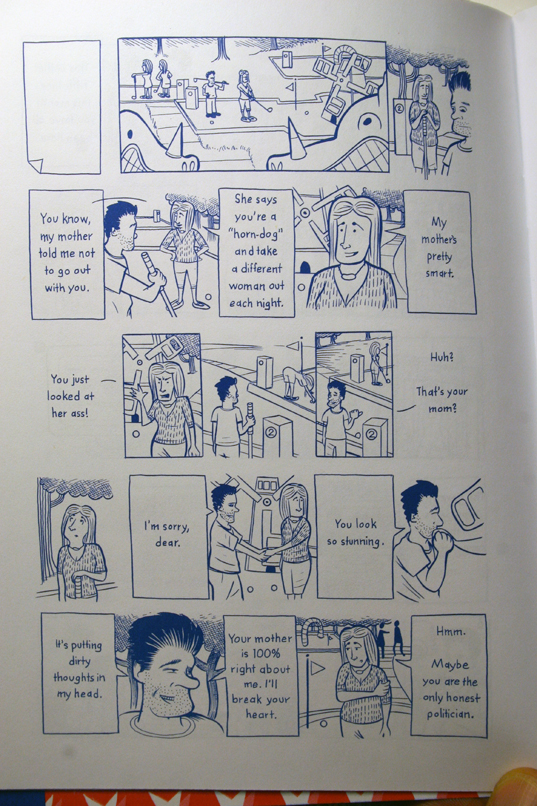
AG: Are you a conservative ?
WD: I’m pretty liberal. A Democrat for sure. If you’re my age and have been paying attention to politics at all for the last 20 years, it’s pretty much impossible to see the Republican Party as anything but a mess. I want very much to keep an open mind and listen to all viewpoints and perspectives. Ablatio Penis is an exercise in that thinking. As a citizen, I’m pretty angry. As a creator, I want my characters to be as well-rounded and real as possible.
WD: I’m pretty liberal. A Democrat for sure. If you’re my age and have been paying attention to politics at all for the last 20 years, it’s pretty much impossible to see the Republican Party as anything but a mess. I want very much to keep an open mind and listen to all viewpoints and perspectives. Ablatio Penis is an exercise in that thinking. As a citizen, I’m pretty angry. As a creator, I want my characters to be as well-rounded and real as possible.
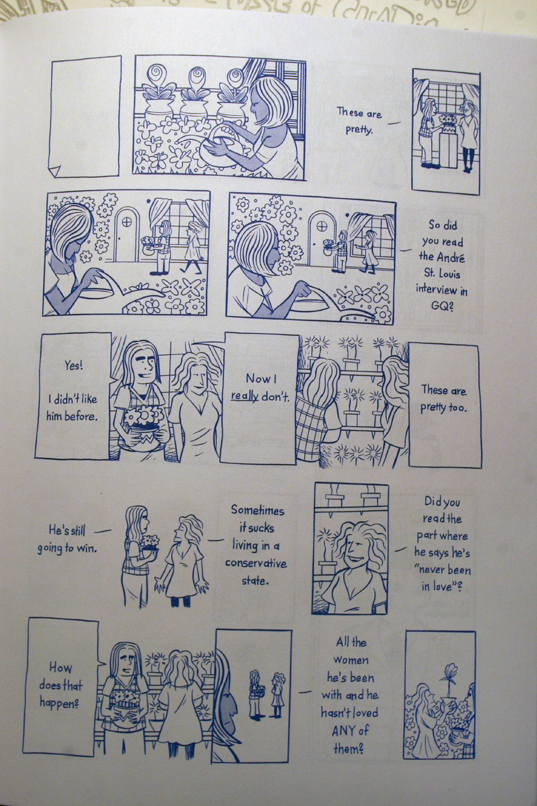
AG: There’s a particular theme of avoidance in this story -- the way you’ve structured the panels is so simple but gives leeway to so many details. None of the characters seem to ever have to talk to each other directly because of the politics in play.
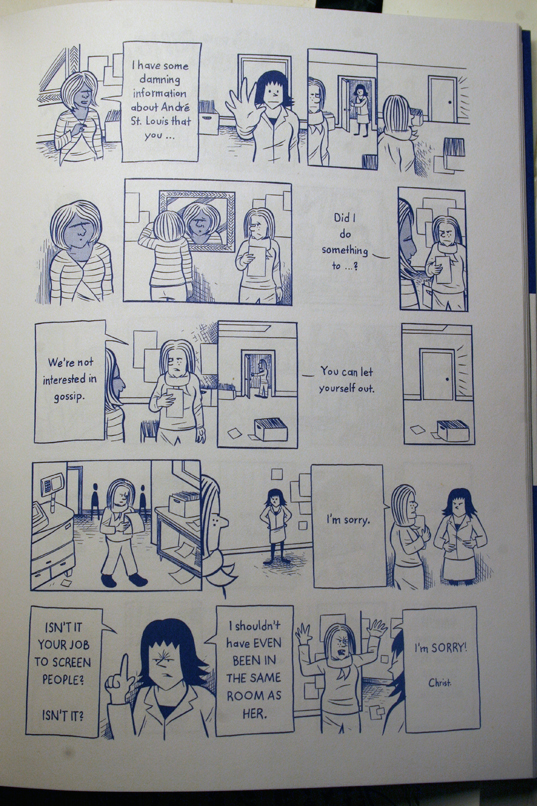
WD: That’s interesting. I hadn’t intended that to be a theme for this book.
However, It’s definitely a central concern in Trying Not to Notice. I like reading stories where the the reader can sometimes know a little more than the character.
However, It’s definitely a central concern in Trying Not to Notice. I like reading stories where the the reader can sometimes know a little more than the character.
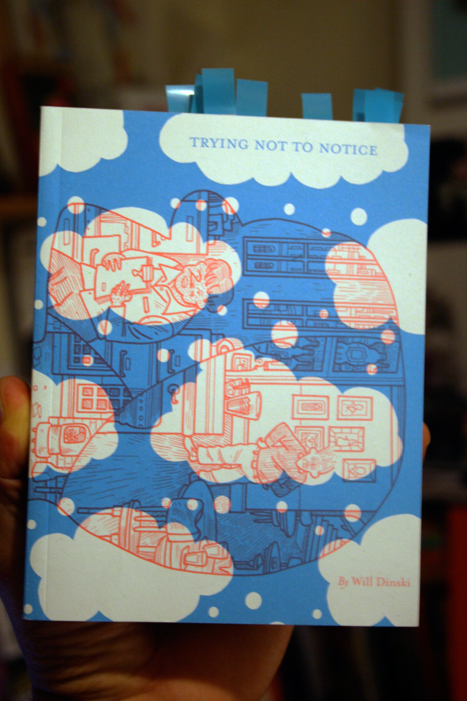
AG: TRYING NOT TO NOTICE is a story piecing together four points of view – that of a failed comedian, an aspiring comedian and his wife, and that comedian’s co-worker accountant friend. A sort of morality tale plays itself out where you expose the most morally rewarding character’s artificiality. Did the other characters enable him?
WD: My perspective is that each of the characters is avoiding or ignoring something about their lives. However, you can’t see that part through their eyes alone. You need to get a glimpse of them through someone else.
I know a cartoonist who found out at the age of 30 that he was autistic. He had no idea for much of his adult life. Of course, those of us who knew him had a hunch. We probably all have something like that about ourselves. It’s terrifying to think about.
WD: My perspective is that each of the characters is avoiding or ignoring something about their lives. However, you can’t see that part through their eyes alone. You need to get a glimpse of them through someone else.
I know a cartoonist who found out at the age of 30 that he was autistic. He had no idea for much of his adult life. Of course, those of us who knew him had a hunch. We probably all have something like that about ourselves. It’s terrifying to think about.
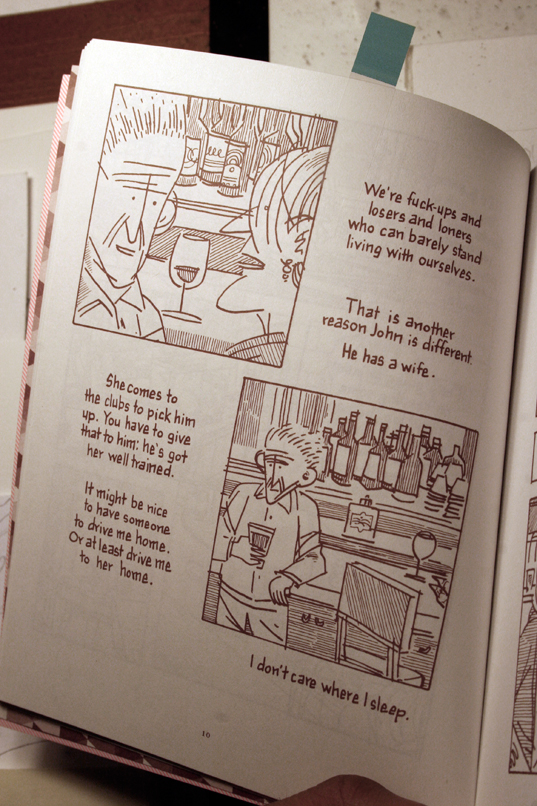
AG: Summer (below) is a competent accountant, but she’s maybe also apathetic to everyone around her. Somehow this ends up becoming a benefit to her, and that has something to do with her relationship to beauty. How do you feel entertainment industry culture affects the characters ?
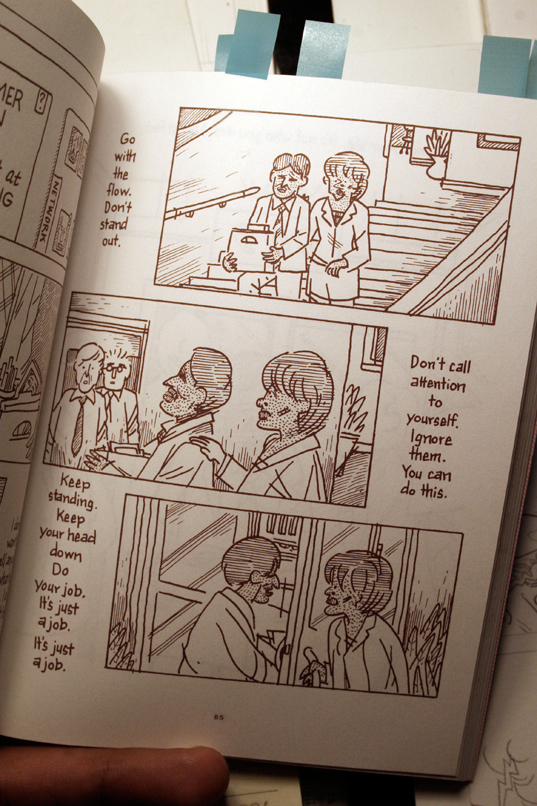
WD: The entertainment industry just works really well as a frame for stories about modern life. It seems like so many people that I know (myself included) “perform” more than we would if social media didn’t exist. In that sense, it’s a way to talk about presentation, entertainment and beauty and how we think about those things without feeling like I’m an old man yelling at a cloud.
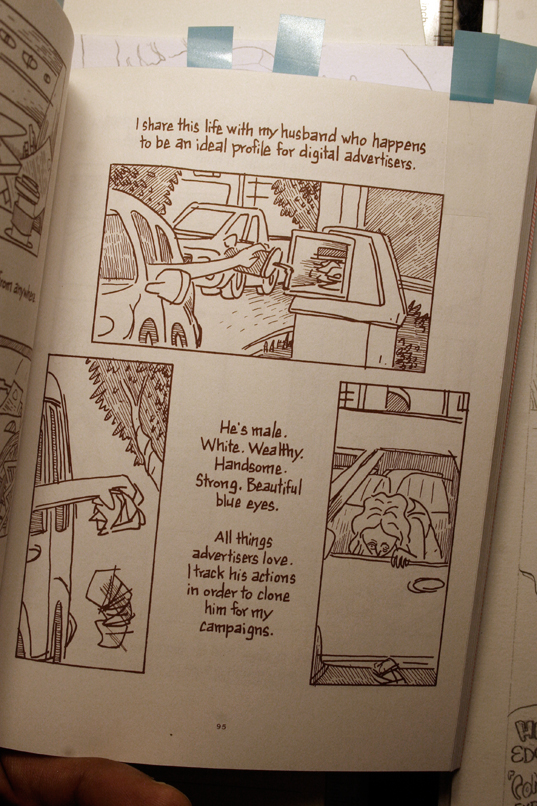
AG: This next page (above) is probably one of the most striking pages in the story for me, probably because I’ve never witnessed such a landslide in a character-driven plot like this before. Amanda is introduced very late in the story, yet ends up confirming who the main character of the story is – it’s great! It made me feel as if I had been reading a mystery, but definitely experimental. Do you have any type of genre writing in your past?
WD: Thanks! I very much enjoy genre. My belief is that all stories fall into some type of genre. I’d love to write a mystery or thriller someday. Graham Greene is one of my favorite authors, and if I could write a thriller half as good as Brighton Rock, I could die happy.
WD: Thanks! I very much enjoy genre. My belief is that all stories fall into some type of genre. I’d love to write a mystery or thriller someday. Graham Greene is one of my favorite authors, and if I could write a thriller half as good as Brighton Rock, I could die happy.